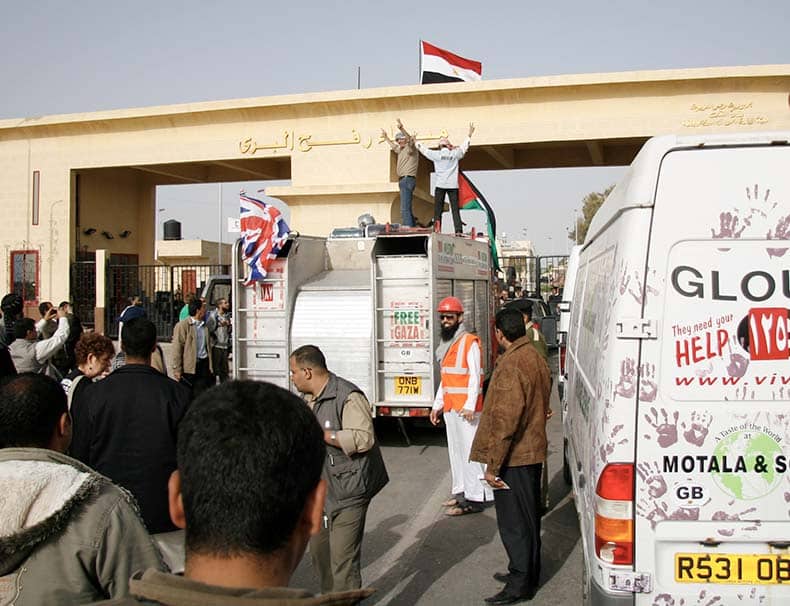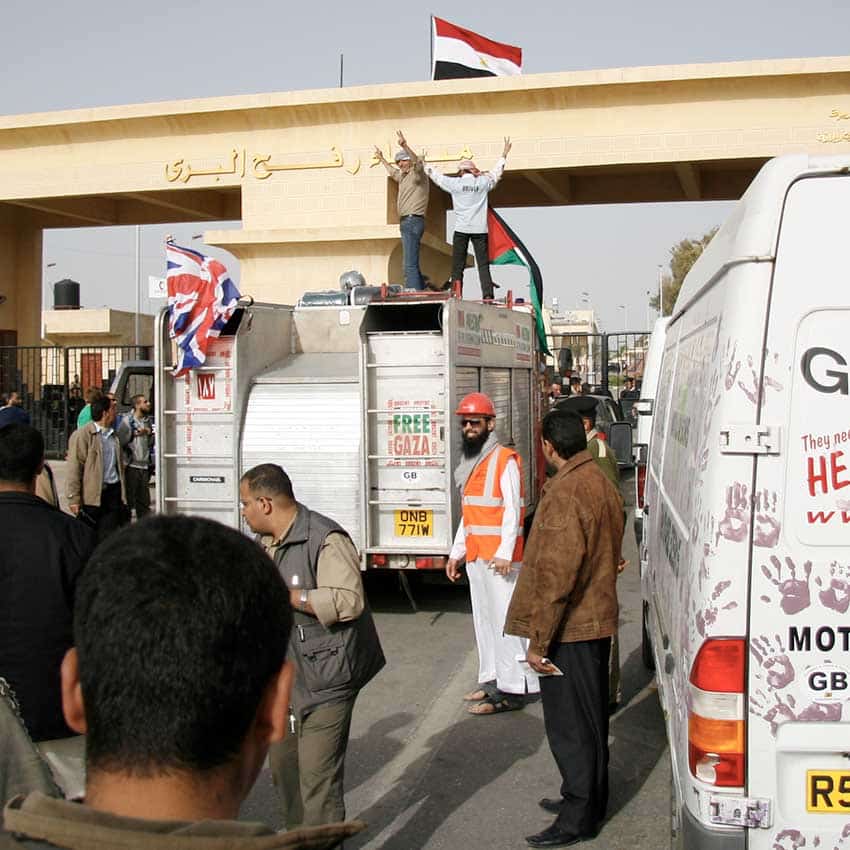Operation “Iron Swords,” launched by Israel against Hamas following the deadly terrorist attack on October 7, 2023, placed Egypt in a sensitive, problematic, and complex position. The Egyptians found themselves having to deal with the impacts and consequences of a war that is not theirs, across five main arenas: peace relations with Israel, the overall Palestinian system and particularly Hamas’ rule in the Gaza Strip, the inter-Arab sphere, the international community (especially the United States), and Egypt’s internal arena.
In this article, I will examine the various aspects affecting our southern neighbor under the current reality, drawing extensively on my accumulated experience — both from ongoing monitoring of the Egyptian political scene and particularly from my active involvement in various channels of security-political-strategic dialogue between Israel and Egypt in recent decades, primarily in my capacity as an advisor to Defense Ministers on Arab affairs.
To understand Egypt’s attitude toward the Gaza Strip, we must first return to the period before the establishment of the State of Israel. The Strip was included in the British Mandate for Palestine, which was designated for the establishment of a national home for the Jewish people. According to the UN General Assembly’s Partition Plan of November 29, 1947, the Gaza Strip — along with other surrounding areas — was intended to be part of the future Arab state alongside the Jewish state. The IDF’s victory over the Egyptian army in “Operation Horev” toward the end of the War of Independence reduced the territory that was ultimately excluded from the Jewish state to a narrow coastal strip — the Gaza Strip — whose borders were defined in the armistice agreements signed in Rhodes between Israel and Egypt in 1949.
From January 1949 until the Six-Day War in June 1967, Egypt administered a military government in the Gaza Strip, except for a short six-month period between October 1956 and March 1957 following the Sinai Campaign. Since losing control over Gaza, Egypt has led the Arab collective’s struggle against Israel, aiming to restore sovereignty over the Sinai Peninsula and to promote the realization of Palestinian political aspirations in the conflict with Israel.
In March 1979, the peace treaty between Israel and Egypt was signed, under which the Sinai Peninsula was returned to Egyptian control. As part of this agreement, a buffer zone was established along the border between the Gaza Strip and Egypt, known in IDF code maps as the “Philadelphi Route.” This well-known corridor stretched about 14 kilometers, within which Egypt created a separation zone roughly two kilometers wide. In this area, Egypt systematically acted to clear the land of structures and to collapse smuggling tunnels dug along the route, including by flooding them with seawater using a network of pipelines. According to the peace treaty, the border passed through the city of Rafah, and when Israel withdrew from Sinai in 1982, the city was divided between Egypt and the Gaza Strip. The Camp David Accords of September 1978 included a call for the implementation of an autonomy plan for the West Bank and Gaza Strip, which was to be replaced by a permanent agreement after five years.
Between Two Presidents
Over the years, Egypt’s relationship with the Gaza Strip has experienced ups and downs. The most significant deterioration occurred after Hamas ousted the Palestinian Authority from the Strip and seized control through violence in June 2007. Hamas was effectively considered a branch of the Muslim Brotherhood and was, from Egypt’s perspective, rejected and reviled. Following Hamas’s takeover of the Strip, Cairo closed the Rafah Crossing — the only border crossing between Egypt and Gaza. Egypt’s stance toward Hamas shifted when Mohamed Morsi, a key figure in the Muslim Brotherhood, served as president. This change became apparent at the start of Israel’s Operation “Pillar of Defense” (November 14–21, 2012) in Gaza, when Egypt under Morsi recalled its ambassador from Israel. Although Egypt did not sever ties with Israel and certainly did not heed calls to join the campaign alongside Hamas, the organization was perceived as a legitimate and close actor, functioning in effect as the Palestinian extension of the Muslim Brotherhood, particularly in Gaza. Against this backdrop, Egypt’s dialogue with Hamas expanded at the expense of the Palestinian Authority, although communication with the PA was not severed and continued in practice. The legitimacy granted to Hamas by the Egyptian regime steadily grew, with a clear expression of this new trend manifesting in President Morsi’s first meeting in Cairo with Hamas senior figure Ismail Haniyeh, who was received with high honors at the presidential palace as the Palestinian prime minister from Gaza.
In contrast to the warming of relations during Morsi’s tenure, the early years of President Abdel Fattah el-Sisi’s rule — beginning with his election in June 2014 — were marked by Egypt’s central interest in distancing itself from the Hamas-controlled Strip. From our Egyptian interlocutors, we consistently and unequivocally heard that the situation in Gaza, particularly concerning the well-being of its residents, was the exclusive responsibility of Israel, and that Egypt had no intention of playing any significant role in addressing humanitarian or civilian needs. In applying this policy, Egypt also sought to isolate Hamas and prevent it from maintaining connections or cooperating with Islamic terrorist networks in the Sinai Peninsula.
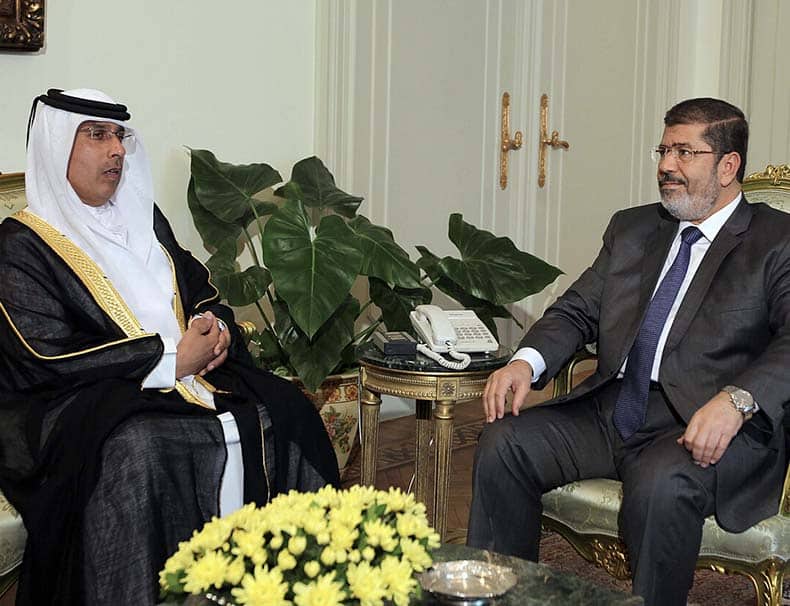
A significant escalation in Egypt-Hamas relations occurred during Operation “Protective Edge” (July–August 2014), when Hamas’s demand to open the Rafah Crossing for goods and people was rejected. Moreover, Egypt was firm in its position that opening the crossing would pose a threat to its national security. Egyptian media, which typically reflect the regime’s stance, claimed that Hamas’s true objective in making this demand was to secure its continued rule over Gaza, and that the conflict with Israel had not been initiated out of any genuine commitment to the Palestinian national struggle. “Reality shows that Hamas only cares about the Rafah Crossing, with its aim to breach the Egyptian border and realize the Muslim Brotherhood’s dream of strengthening the Palestinians from Sinai,” wrote the Egyptian newspaper Al-Wafd in July 2014.
Egyptian media aligned closely with the government’s position and frequently leveled harsh criticism at Hamas. In January 2015, this policy was officially affirmed when the government designated Hamas a terrorist organization. This move dealt a severe blow to Hamas and sparked significant anger and resentment among its senior members. Some time later, this decision was slightly softened when the classification of the entire movement as a terrorist organization was revised to apply only to its military wing (the Izz al-Din al-Qassam Brigades).
From meetings held over the years between Israeli officials and President el-Sisi, it became evident that his position did not deviate in the slightest from the well-known parameters of the Arab consensus, which calls for the establishment of an independent Palestinian state along the 1967 borders in the West Bank and Gaza Strip, with East Jerusalem as its capital. Moreover, from el-Sisi’s perspective, progress in the Israeli-Palestinian peace process was consistently presented as a prerequisite for expanding cooperation with Israel beyond the military-security sphere, to other fields such as economy, trade, agriculture, religion, and more.
Based on the ongoing security-political dialogue with Egypt, it was evident that the president’s fundamental stance toward Hamas was grounded in viewing the organization as a severe and dangerous ideological adversary. Given Hamas’s organizational and ideological nature as an offshoot of the Muslim Brotherhood, el-Sisi saw it as a bitter enemy that must be opposed and whose negative influence must be curbed. This position was reflected in a firm and confrontational policy toward Hamas, aimed at undermining the organization’s status and weakening it.
The Palestinian Authority as a Natural Partner
Egypt’s opposition to Hamas intensified even further following Operation “Protective Edge,” which occurred around the time of President el-Sisi’s official appointment. His election, as mentioned, marked a turning point in relations, which became increasingly characterized by hostility, suspicion, and distrust, also from Hamas itself. The strained relationship between the two sides was reflected primarily in a significant reduction of contacts and in the conduct of dialogue at low-ranking levels rather than between senior leaderships — a sharp contrast to the nature of communication during President Morsi’s tenure. The dialogue focused mainly on routine issues such as the operation of the Rafah Crossing for two-way Palestinian movement, Hamas’s ties to terrorist infrastructure in the Sinai Peninsula, and the like. Egypt also worked to further differentiate itself from the Gaza Strip as part of its effort to weaken Hamas’s collaboration with Islamic terrorist groups in Sinai and to disrupt the organization’s smuggling infrastructure.
As part of its actions against Hamas, Egypt implemented a policy of controlled and limited openings of the Rafah Crossing. Over the years, the crossing was opened sparingly — every few weeks or months and only for brief periods of a few days — to allow humanitarian-based exits from or entries into Gaza for students, pilgrims to Mecca, patients, and others. During these years, Egypt also did not permit senior Hamas figures to exit the Strip via the Rafah Crossing.
In conversations with Egypt’s military-security establishment in Cairo, the Egyptians consistently emphasized to us that the sole and authoritative body for making decisions regarding the Palestinian issue was the Palestinian Authority, headed by Mahmoud Abbas. This precise position also had practical implications, from which it was evident that although Egypt de facto and begrudgingly acknowledged Hamas’s rule over Gaza, it was striving and expecting, over time, to bring about a change in the existing reality and to reestablish the PA’s rule in the area. Hamas, from Egypt’s perspective, was not a legitimate, representative, or authoritative actor.
Egypt’s interest in strengthening the status of the Palestinian Authority in the Gaza Strip — and ultimately reinstating its rule in the region — was a central principle of its policy. This stemmed from its view of the PA as the legitimate representative of the Palestinian people, its perception of Hamas as a threat, and the assumption that uniting the West Bank and Gaza Strip under a single governing authority, alongside weakening Hamas’s power and influence, was a necessary condition for advancing a solution to the Palestinian issue.
Since the beginning of the military confrontation between Israel and Hamas, Egypt has maintained a clear and consistent position opposing the displacement of Palestinian refugees and their transfer to its territory, while also emphasizing the need for a ceasefire and the expansion of humanitarian aid to residents of the Strip. Egypt perceived the influx of Palestinians from Gaza into its territory as a threat: beyond the economic burden on the Egyptian economy, it could also pose a security risk, undermine Egyptian sovereignty in the Sinai region, jeopardize achievements in the fight against jihadist organizations in the area, and lead to the entry of terrorist operatives into Egyptian territory. Moreover, Egypt feared that agreeing to host Palestinian refugees could damage its image, portraying it as having enabled the liquidation of the Palestinian issue and the creation of a second Nakba, effectively casting Egypt as acting in Israel’s service and implementing its unspoken ambitions.
In practice, this was Egypt’s position regarding U.S. President Donald Trump’s plan involving the transfer of Palestinians from the Gaza Strip and the establishment of American control in the area. This plan was met with significant opposition from the regime in Cairo, which responded by attempting to build broad Arab consensus against it and by presenting the initiative as a theoretical, unfeasible concept. To that end, Egypt convened an emergency Arab summit in early March 2025 in Cairo, during which Arab leaders adopted Egypt’s plan for Gaza’s rehabilitation and the establishment of an independent Palestinian committee for its temporary administration until the PA’s rule could be reinstated. All of this was to be carried out while “keeping the Palestinian people on their land” and included a call to establish an international fund to mobilize resources for the Strip’s reconstruction.
Since the start of the war against Hamas in October 2023, between 130,000 and 150,000 Palestinians have already left the Gaza Strip, with less conservative estimates suggesting around a quarter of a million. It is highly likely that, given the widespread damage to civilian infrastructure and the disruption of living conditions that have become unbearable, hundreds of thousands more Palestinians residing in the Strip will seek to emigrate from the area in the future.
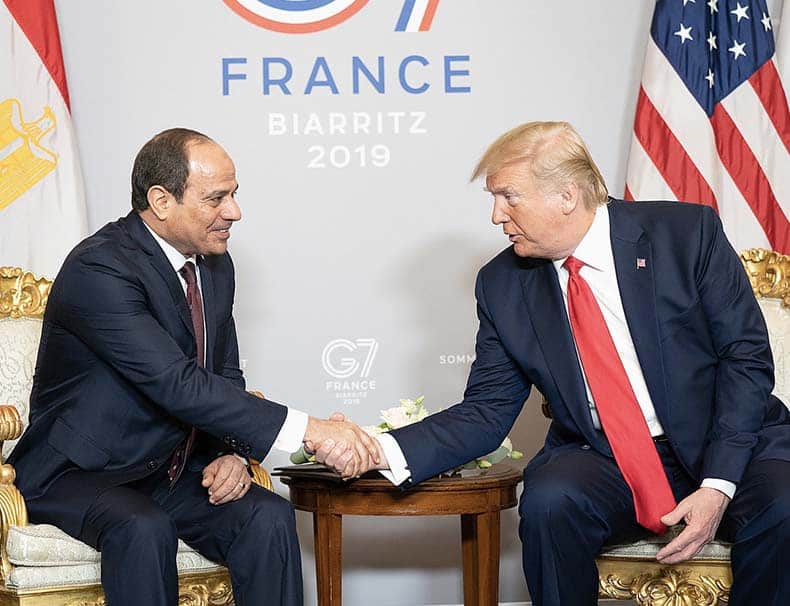
Hostile and Antisemitic Discourse Sponsored by the Regime
Alongside Qatar and the United States, Egypt played a central and significant role in indirect mediation efforts between Israel and Hamas during the “Swords of Iron” war. This role was not new to Egypt, which had already served as a primary — and at times exclusive — mediator during President Hosni Mubarak’s rule, following previous confrontations between Israel and Hamas. This trend continued under President el-Sisi, with Egypt acting as the mediator during Operation “Protective Edge” and later during Operation “Guardian of the Walls” (May 2021). The mediation task that Egypt assumed at the start of the war offered it certain advantages in the regional arena as well as within the international community. However, it also highlighted Egypt’s objective limitations in its maneuvering capacity, exposing it to internal risks. It forced it to exercise restraint in its reactions to the developments in the conflict between Hamas and Israel.
The October 7 attack and the ensuing war dramatically increased expressions of hostility and hatred toward Israel on the Egyptian street and in the media. This even escalated to attempts to challenge the legitimacy of Israel’s very existence. On a concrete level, a hostile stance toward Israel in the context of the war was observable from President el-Sisi, former Foreign Minister Sameh Shoukry, his successor Badr Abdel Aaty, and the head of Al-Azhar, the highest authority in Sunni Islam.
The Egyptian regime, aware of the public sentiment, allowed during the war a hostile and even antisemitic discourse against Israel and Jews to flourish in the media and on social networks. Full support was expressed for the Palestinian struggle, and the Egyptian authorities were called upon to react sharply to Israel’s actions, which were portrayed as those of Egypt’s eternal enemy and the enemy of the Arab world. At the beginning of the war, the regime in Cairo was involved in organizing demonstrations to express support for the Palestinians in Gaza and to rally public backing for the government. However, as the war dragged on and the hardship it caused residents increased, there was growing concern that support for the Palestinians could shift into protest against the regime itself.
It is important to note that media coverage in Israel regarding the potential forced expulsion of Palestinians from Gaza was presented on the Egyptian side as a conspiratorial Israeli move intended to harm Egypt’s national security and stability. There was a strong impression that the fear of Palestinian expulsion was honest and genuine, and that it constituted a “red line” for the regime in Cairo.
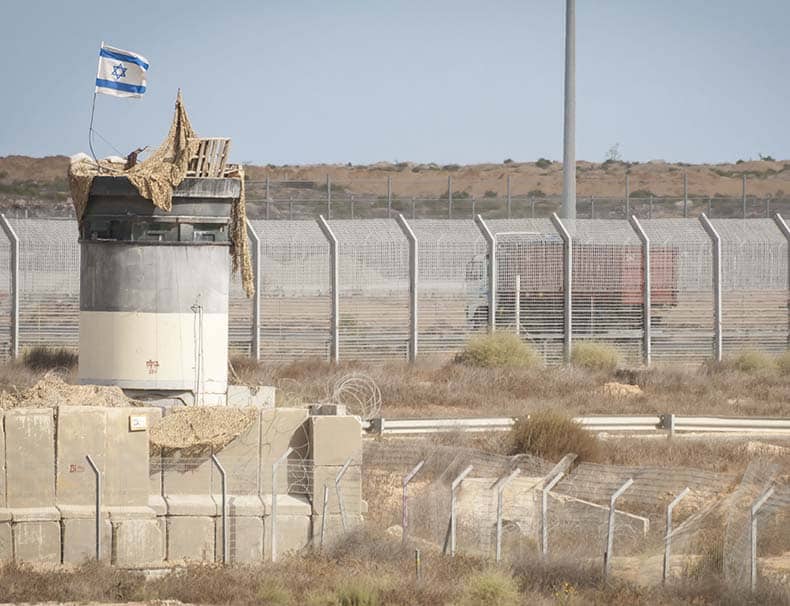
A Complex Environment of Conflicting Constraints
There is no doubt that Egypt has a principled interest in ultimately defeating Hamas, which was established and has operated for nearly half a century as the Palestinian branch of the Muslim Brotherhood. In this context, Egypt’s basic strategic stance views Hamas clearly and unequivocally as a threat. Nonetheless, even if the regime in Cairo has a clear interest in the downfall of Hamas — both as a military entity and as a civil governing body in Gaza — it does not want to appear as the party paving the way for that outcome or as collaborating with Israel’s actions in this regard. In addition, the masses in the Arab street, including within Egypt itself, who refrained from condemning Hamas’s terror attack and even saw it as a heroic and legitimate act within the Palestinian resistance, might interpret such a move as a blow to the fundamental interests of the Palestinian people and their resilience in facing Israel.
Under these circumstances, President el-Sisi has had to navigate a complex environment of conflicting constraints, requiring careful conduct amid the expectations and positions of relevant actors — expectations that are not always aligned with Egypt’s plans or core interests.
The absence of a clear Israeli policy regarding the day after the war presents Egypt with challenges and limitations in shaping its strategy concerning the future governance and control of the Gaza Strip. In any case, Egypt seeks to achieve ground-level arrangements as reflected in the conclusions of the Arab emergency summit held in March 2025, in a manner that does not portray it as complicit or collaborative with Israel’s actions. It appears that Egypt’s preferred solution lies in taking a central role within the Arab reconstruction plan for the Gaza Strip, with the agreement and backing of the Palestinian Authority. This would serve as one component among a series of measures involving other Arab countries, with an emphasis on Saudi Arabia, that could reinforce Egypt’s position as an essential and leading actor in promoting regional resolution initiatives.
